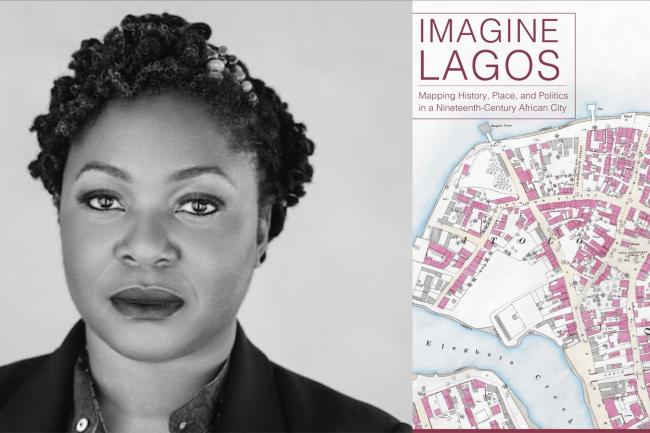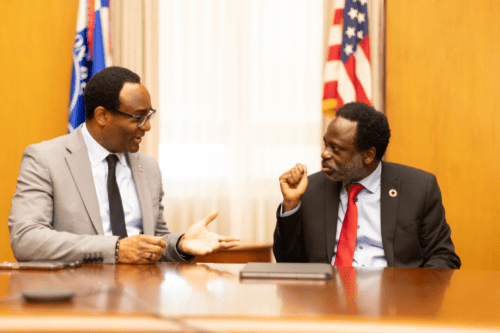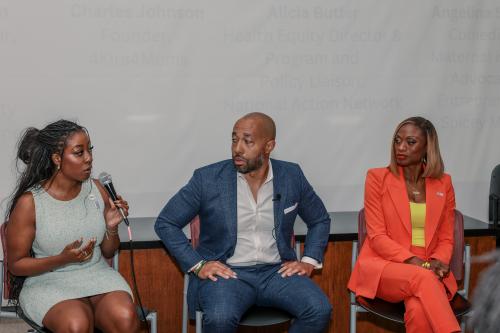Howard University historian Ademide Adelusi-Adeluyi is reshaping how we understand African history, one map at a time.
As part of the ongoing seminar series, “Slavery, Memory, and African Diasporas,” Ademide Adelusi-Adeluyi, Ph.D., an associate professor of history at Howard University, delivered a lecture that illuminated the intricate historical layers of Lagos—a city significant to Yoruba history and now one of the largest and fastest-growing urban centers in the world. The seminar, organized by professor of history Ana Lucia Araujo, Ph.D., took place on Jan. 26.
“Lagos is a city with scars—scars from war, bombardments, enslavement, political competition, and colonialism,” Adelusi-Adeluyi said. “These histories are embedded in the present and visible in the city’s historical core.”
Adelusi-Adeluyi’s new book, Imagine Lagos, focuses on the 19th century—a period she described as laying the political and economic foundations of contemporary Lagos. Her methodology includes an innovative technique called “walking cartography,” in which she gathers firsthand knowledge from the city fabric itself by observing and recording lingering physical details that reveal traces of the past.
She explained that “walking cartography” allows her to fill in historical narratives about 19th-century city life that might otherwise have been lost. It also helps address the challenges of documenting African history, particularly for oral cultures like the Yoruba.
The lecture on Lagos was organized by Howard University’s History Department and co-sponsored by the Moorland-Spingarn Research Center. It is part of a broader seminar series examining slavery, memory, and the African diasporas, as well as African history.
Adelusi-Adeluyi said her research offers a fresh perspective on African urban history, challenging existing narratives that often overlook the complexities of African cities like Lagos. She emphasized how the scars of war, enslavement, and colonialism have shaped Lagos’s identity, calling it a “wounded city.”
“Oral cultures in West Africa are beautifully expressive and sophisticated,” Adelusi-Adeluyi said, “but their transmission is also vulnerable to disruption from war, colonialism, and displacement. This makes the historian’s task of preserving and interpreting them all the more vital.”
Adelusi-Adeluyi explained how her project builds on the work of the late historical geographer Akin Mabogunje, who highlighted the significance of thinking about the environment in uncovering Lagos’s history.
“Maps provide visual texture for Lagos’s environment—its rivers, lagoons, neighborhoods, markets, and streets,” she explained.
Street names in Lagos, for instance, are also important repositories of history. They highlight people and place: for example, names of important Lagosians such as Kosọkọ and Taiwo; men from the diaspora who returned to Lagos, like Harden, Bamgboṣe, and Campbell; and even a handful of stories of women, like Tinubu, Faji, and Tijuiku.
"Street names like Ṣọpọṣọ, Oju Olokun, and Ẹlẹgbata point to stories of healing, orisa [oriṣa] worship, and even creeks and lagoons that have been covered up," she said. "By comparing 19th-century maps to modern ones, we can peel back the layers of time and uncover the city’s transformation.”
Adelusi-Adeluyi emphasized the gaps in African history education, particularly regarding the transatlantic slave trade.
“So much of what I learned about slavery began here in the United States,” she noted, highlighting the absence of physical reminders in Nigeria, such as those found in Ghana’s Elmina or Cape Coast Castles.
She also underscored the value of mapping as a tool for connecting the African diaspora to their heritage. Through the digital features of the Imagine Lagos project, she demonstrated how historical maps allow audiences to not only visualize the past but also reflect on the present. These maps can be accessed online at imagineLagos.com.
“Maps offer not just geographical insights but also a sense of connection to history and identity,” she said.
The “Slavery, Memory, and African Diasporas” seminar series will continue on Feb. 12 with a discussion of The Texture of Change by Jody Benjamin, PhD, also a Howard University associate professor of History. The book examines historical change across western Africa, from Saint Louis, Senegal, to Freetown, Sierra Leone, through the lens of textile commerce, consumption, and dress. For more information about upcoming seminars in this series, visit Howard University Events.





